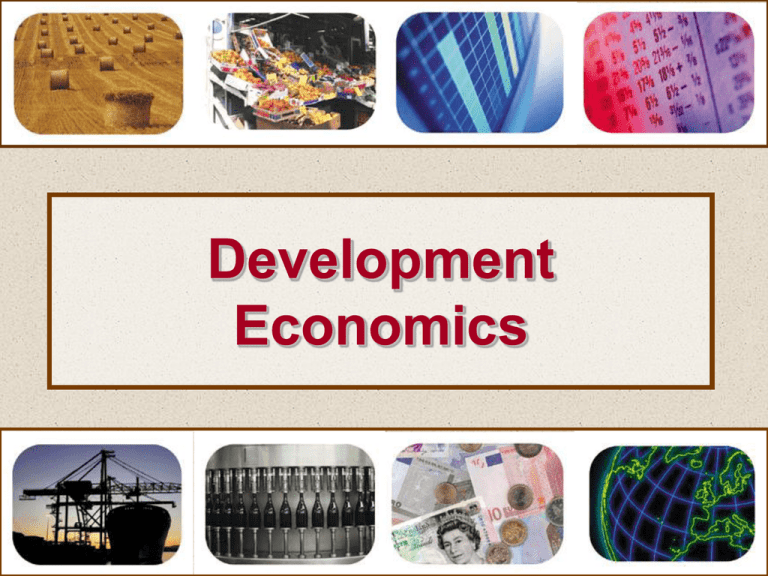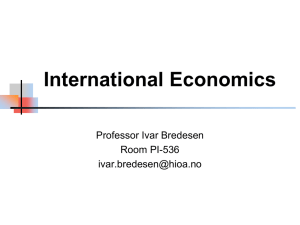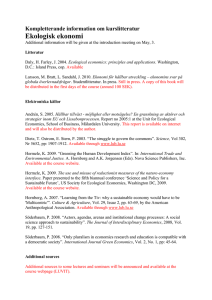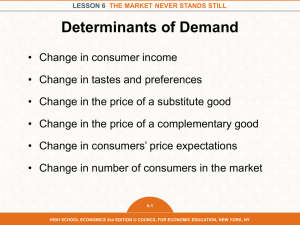Scope of Development Economics
advertisement

Development Economics Development Economics Introduction to Development Economics DEVELOPMENT ECONOMICS: Development Economics is the branch of Economics which deals with the Economic Development of the Less Developed Countries (LDC). Along with the efficient utilization of scarce resources and their growth over time as focused on by traditional economics, development economics tries to cover the political, social , economic and institutional mechanisms to bring about rapid and large scale improvements in the life standards of poor and malnourished populations of developing countries. Development Economics The need for a separate field of economics was felt as existing and traditional areas of economics were unable to bring any significant shift in the economic prospects of many developing countries. In the above context development economics tries to focus on various areas to bring about a noticeable change in the economic prospects of developing countries:Development Economics is said to be the Economics dealing with Economic Growth of the less developed countries (LDCs), Poverty & Unemployment, Rural, Agricultural and Industrial backwardness, Human and Capital Resource Mobilization and Problems regarding International Backwardness and Development. Development Economics (continued) Development Economics, must, therefore, identify the mechanisms that keep entire societies in poverty and develop strategies that will enable people to break out of the trap of poverty and backwardness. Development Economics needs to be concerned with political, economic and cultural requirements of progress and change so that rapid transformation of entire societies so as to spread the fruits of economic progress as broadly as possible. Important Questions in Development Economics? 1. What is the real meaning of development and how we can develop a better understanding of the process of development. 2. What are the sources of growth and why do some countries develop rapidly whereas others lag behind ? 3. Is development an internally or externally induced phenomena? 4. What can be learned from the historic process of development as shown by the developed countries? How similar or different conditions are in less developed countries in comparison to developed countries when the started on the process of development? Important Questions in Development Economics? 5. What role can women play in speeding up the process of development? How can their role in economic processes be improved? 6. What is the impact of rapid population growth on the process of growth and development 7. What are the causes of extreme poverty and what policies are most effective in improving the lot of the extremely poor? 8. What is the impact of better or poor health on the process of development? Important Questions in Development Economics? 9. What are the causes of unemployment in developing countries? 10. What is the connection between agriculture and development? 11. What is the link between ecology and development 12. Does expanded international trade work in favor of developing countries how should developing countries protect local industry? Important Questions in Development Economics? 13. Should primary products be exported or should they be processed and value added? 14. How can developing countries resolve their serious debt issues? 15. When and how should developing countries protect local industry? 16. What impacts have IMF & World Bank had on the development of third world economies? Important Questions in Development Economics? 17. Multi national corporations and investment in developed countries. Who gains? 18. Globalization’s impact on poorer countries? 19.What is the impact of foreign aid on developing nations? 20.Are free market economy and privatization the answer to poor countries development and what should be the role of government in developing countries? 21 Why do developing countries have such poor development policies? Important Questions in Development Economics? 22. What is the impact of fiscal and monetary policies on development? Do large military budgets stimulate or retard growth? 23. What are the reasons for extreme differences in income between the relatively few rich and many poor? Scope of Development Economics: Chapter 1: Introduction to Development Economics: This chapter ‘introduction to Development Economics’ introduces the subject, its importance and its area of study. This chapter covers the following points in detail. • What is Development Economics and its Area of study • What are the Reasons for studying development economics. • Which countries are Less Developed Countries (LDCs) and what are their common Characteristics. Scope of Development Economics…..continued Chapter 2: Development Vs Growth This chapter ‘Development Vs Growth’ brings under discussion the basic difference between the two economics terms and specifically focuses on economic development. It covers the following points in detail. • What is Economic Growth & Economic Development, • What are the Elements of economic development • What Structural Changes are needed for development Scope of Development Economics…..continued Chapter 3: Economic Development This chapter ‘Economic Development’, highlight the importance of economic development. It also determines that for a country to develop, what the are essentials. This chapter covers the following points in detail. • What are the Objectives of Development • What are the Indicators of economic development • What are the Pre-requisite of economic development Scope of Development Economics…..continued Chapter 4: Economic Development (continued….) This chapter is the continuity of the chapter 3 ‘Economic Development’ focuses on the various obstacles in the economic development. This chapter covers the following points in detail. • What are the Obstacles to economic development of the Less Developed countries. • What are the Remedial measures for economic development. Scope of Development Economics…..continued Chapter 5: Capital Formation This chapter ‘Capital Formation’, highlight the importance of increase in the stock of capital of a country over time. It covers the following points in detail. • What is Capital Formation & its importance • What are the Sources of capital formation in the Less Developed Countries (LDCs) • What are the Causes of low capital formation in LDCs • What are the Measures to increase capital formation. Scope of Development Economics…..continued Chapter 6: Development Tools In this chapter ‘Development Tools’, various tools that could be used for developing a country are discussed. It covers the following points in detail. • Per capita Income & economic development • Deficit Financing & economic development • Privatization Policy & economic development • Technology & economic development Scope of Development Economics…..continued Chapter 7: Foreign Resources and Development This chapter ‘Foreign Resources and Development’ is the continuity of the previous chapter ‘Development Tools’. Foreign Resources can be utilized for economic development of a country. This chapter covers the following points in detail. • What is Foreign Aid & What is the role of Foreign Aid in the economic development of LDCs. • What is Foreign Investment & What is the role of Foreign Investment in the economic development of LDCs. Scope of Development Economics…..continued Chapter 8: Population & Development This chapter ‘Population and Development’ focuses on the population aspect of the LDCs. This chapter covers the following points in detail. • What are the Effects of increasing population on the economic development of LDCs. • What is Human Capital Formation and what are its problems in LDCs. • What is Human Resource Development • What is Manpower planning and what are its objectives. Scope of Development Economics…..continued Chapter 9: Urbanism & Economic Development This chapter ‘Urbanism & Economic Development’ explains the benefits of the urban areas to the people, Manufacturers, traders, and the whole economy. This chapter will cover the following points in detail. • What is an urban area • What are the benefits of urban areas to The household The trade The economy. Thank you









